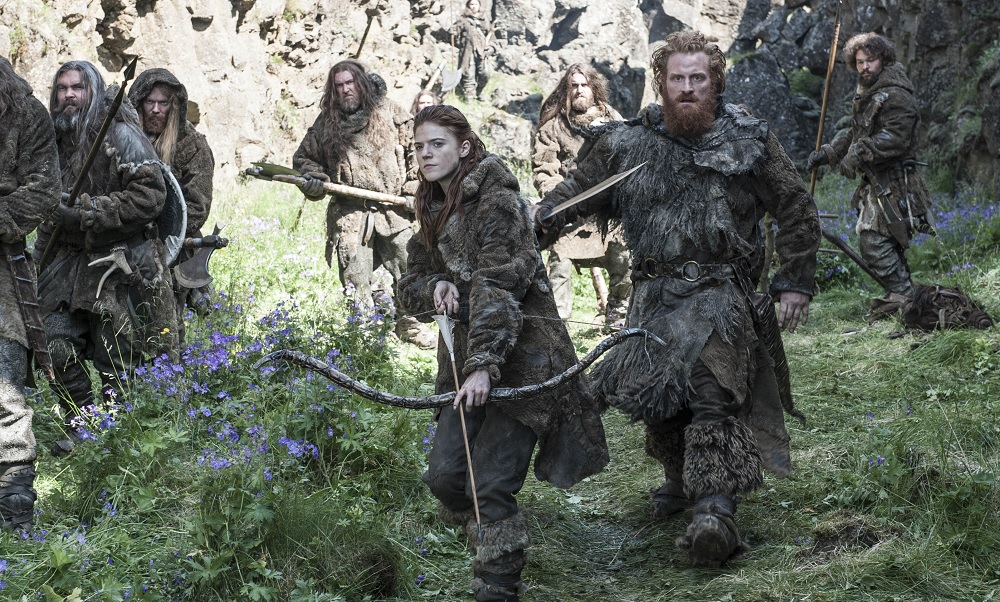
They call themselves the “Free Folk” but the Westerosi who reside south of the Wall refer to them as “wildlings”. The very name, despite being derogatory, seems to imply that they aren’t civilized or good people: that they are violent savages. They do have a bad reputation among the people of the Seven Kingdoms, who would mostly prefer them to be kept in the other side of the Wall.
In the same way there are many Noble Houses and different cultures in both Westeros and Essos, the wildlings aren’t an homogeneous group but rather distinct groups of people.
The King-Beyond-the-Wall Mance Rayder united them under a single banner for a time, but they are normally divided in different clans and tribes. Sometimes they mind their own business and other times they fight with each other.
Rather than just offering a character summary, I’ll go over the different tribes and clans, some of which have appeared in the show. Many of them, particularly in the novels, don’t have very detailed descriptions, only the bare minimum to differentiate them from one another -but that’s enough to make them intriguing, and allows for fun speculation.
The wildling faction that gets more attention and development in both the novels and the show is the vanilla one, perhaps because they’re more similar to the people south of the Wall, and therefore more relatable for us readers/viewers in a way, unlike those with more freaky habits or appearances (would Jon fall in love with a cannibal Ygritte? Most likely not!). Not to mention that, in the case of the TV adaptation, having wildlings with complicated make-up or costumes would be hardly worth the expense – they might be nice to look at, but the money could be better used somewhere else.
However they’re a part of what makes George R.R. Martin’s work so rich and inviting. I for one wouldn’t like to be invited for dinner by the Ice-river Clans, but would I like to learn more about them? Absolutely!
Without further ado, let me introduce you to some of these charming fellows.
Cave Dwellers
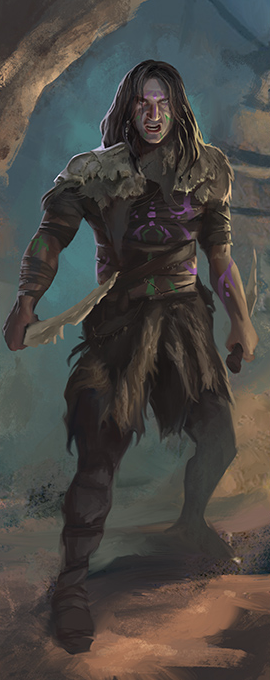
Game of Thrones RPG
Cave Dwellers (or “Cave People”) seem to have a pretty self-explanatory name. They are free folk who live in caves. But alas, ever since they joined Mance’s army, there han’t been a lot of cave-dwellin’ for them.
Their presence in the novels is minimal at best, and it’s the same case in the screen adaptation, in which they do appear, but it’s a blink-and-you’ll-miss-it affair. And that is because they don’t have any lines: we are just told they joined Mance’s army in Season 3, and in Season 5 they are among the other wildlings at Hardhome. They are identifiable because of their painted faces.
With so little information, we don’t have much to discuss about them. Do the other wildlings like them or hate them? What are their habits? What’s their motivation for joining Mance? Escaping the White Walkers or finding warmer and more comfortable caves in the lands south of the Wall?
We can assume, based on their choice of habitat, that they are maybe more primitive than other clans or tribes. But perhaps not. Caves can be comfortable after all, with proper planning and the right amount of commodities. I doubt their caves are empty spaces and that they sleep in the floor, in which case I hope they have at least a rug or two, made with snow bears’ or shadowcats’ pelts.
Nightrunners
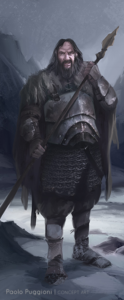
Game of Thrones RPG.
Not much is known about the Nightrunners. That’s not to say we don’t really know anything other than they were enemies of the Hornfoot clan, and both clans fought each other until Mance put an end to the conflict when he recruited them. That’s all there is about them in the books, and they didn’t make it to the show.
A rather simple interpretation, based on their clan’s name alone, is that they have nocturnal habits and are really fast. Or that they (some of them at least) work as a an unit that moves and attacks at night while their enemies are sleeping, which strategically speaking is a great advantage to have in any army. Or it could just be that they dress in dark colors that make it difficult to spot them at night time, or that they live in a region where polar nights are a common occurrence, as it happens in some places of our very own world.
Hornfoots
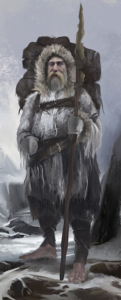
Game of Thrones RPG.
The members of the Hornfoot clan are like the less-whimsical, more violent version of hobbits. And that is because they refuse to use footwear – no shoes, no boots, no nothing. The soles of their feet become as hard as leather and turn black as a consequence of strolling around in the hard and rocky region near the Frostfangs.
As is the case with the Nightrunners, information is scarce at best, and the adaptation didn’t make use of the Hornfoots, so they’re basically defined by their contempt towards footwear and their feud with the Nightrunners.
It’s a shame in a way that Martin didn’t develop these clans a bit more. It would’ve been fun if they had traits such as lopping off the feet of their enemies or that it’s offensive for Hornfoots to receive shoes as presents. Maybe they show their disapproval at their leaders by throwing boots at them. Too silly? Remember there are members of House Tully with Muppet names.
Frozen Shore Men
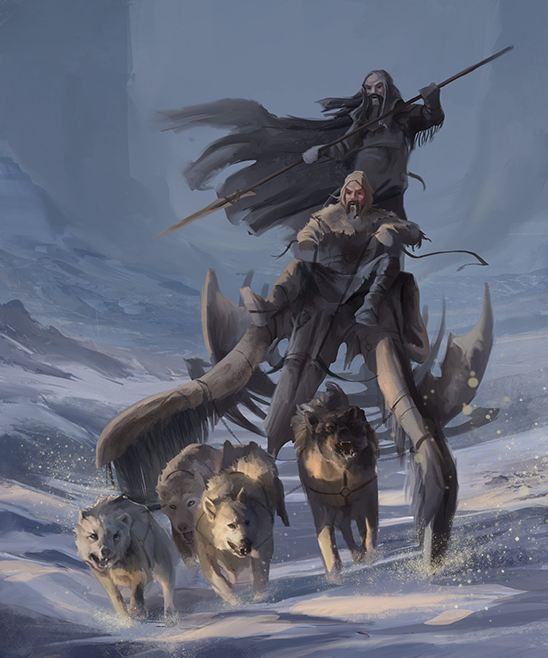
Despite the information about them is limited, they manage to be one of the most picturesque clans. They are basically the wildling version of Inuit people, since fishing and riding on sleds are part of their routine.
Their sleds and chariots are made with walrus bones pulled by huge savage dogs (as big as direwolves!), and their outfits are also made of animal parts, such as their skins, bones, antlers and tusks.
You’d think that if one of them doesn’t like fish, that person would be really unhappy since the menu consists of mostly seafood, but the Frozen Shore people aren’t as isolated as they appear to be – they wouldn’t have been able to join Mance otherwise.
Other wildlings do not seem to like them much: Tormund actually warns Jon about them, because of their savagery.
I wish we could have seen at least one or two of them in the screen adaptation, if only because they’d really stand out among the rest of the free folk and would really drive home the fact that, despite the wildlings share many similarities with the people who live south of the Wall (the same gods, the same language, even many of the same prejudices or social structures), their culture can be vastly different.
It was probably not worth the expense and the effort of making their overly ornate attires, only for a few seconds of screen time. The Cave Dwellers were easier, since they only paint their faces.
Ice-river Clans
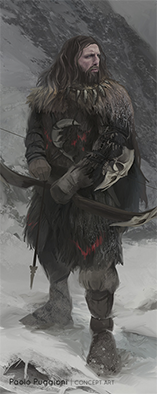
Game of Thrones RPG.
The Ice-river clans aren’t very popular even among their own wildling peers, because of their culinary habits. Turns out they’re cannibals, or at least that is what is said about them.
The place where they live, so close to the Land of Always Winter, is so inhospitable that it’s unlikely they can find many animals or grow anything to eat, so in order to survive they have resorted to attack other wildling tribes: the Frozen Shore Men specifically.
Mance figured out a way to convince both clans to stop warring and join his army. And while I agree that the details of how Mance managed to do that aren’t really important for the story to work, I would have loved to get some nuggets of information instead of just being told that Mance is a skilled negotiator.
How do you convince a group of half-feral individuals who allegedly like to eat people to march with you and not create any disturbance on the way to the Wall and beyond to the south? Promising them more tasty and plump prey?
Despite it was a risky gamble for Mance, it makes sense to keep an unit of cannibals in your army, as some sort of shock and terror unit who’s not only out to kill you, but also to eat you and your relatives. Had the wildlings won the Battle of Castle Black, what Mance would’ve done with the Ice-river clan is anyone’s guess. Let them loose to create further chaos in Westeros? Trying to regulate their eating habits? Probably just feed them dissenters or political enemies?
Thenns
The Thenns either got the short end of the stick or they were improved when it comes to the screen adaptation, since they got merged with the Ice-river clan. It’s quite the odd combination, since the Thenns are the most advanced clan among the wildlings in the books: they don’t eat human flesh, they have some mad metallurgy skills and actually forge their own weapons and armor instead of just looting them from the corpses of rangers.
They also follow a leader known as the “Magnar of Thenn”, and not only that: the title is hereditary. Most wildlings feel open contempt for nobility and “kneelers”, so that a clan implementing this kind of custom so inherent to the feudal society of Westeros is really surprising.
Thenns are uniformly dressed and organized when it comes to warfare. They are as organized and disciplined as a military unit can get, which is yet another difference with most other wildling tribes that look more like ragtag bands of looters.
Perhaps the considerable alterations made to Styr (the former “Magnar of Thenn”) and his men were to make them more scary and a bigger threat. A group of tall, heavily scarred cannibals certainly works better in the show. We wouldn’t have Alliser Thorne’s rousing speech otherwise: “Do you want to fill the belly of a Thenn tonight?”
After the death of Styr (who in the books died after falling into a trap and in the show was killed by Jon Snow in single combat), his son Sigorn becomes the new Magnar of Thenn.
Giants
The giants are, as their name indicates, really tall humanoids. Not quite towering kaiju monsters, but certainly big enough to squash humans without much effort.
Like the direwolves and other creatures that once roamed free in Westeros, the conflict with the First Men forced giants to go beyond the Wall and stay there, which turned them into fictional creatures from songs and fairy tales with the passing of the years.
Though I don’t think there are geniuses among them (they seem to be somewhat primitive, at least when it comes to their weapons, which consist of clubs, logs or stones), they are more intelligent than they seem. They speak the Old Tongue and ride mammoths (how badass is that?).
When Jon is brought to Mance’s camp, we (as readers and watchers) find out that giants are in fact real.
As with the most savage wildling clans, I feel curious about the way negotiations between the giants and Mance went down. How were they convinced to march alongside the wildlings? I suppose the answer for all these questions can be summed up in one word: Others. The widlings all must have realized their survival depended on their success of being able to go south of the Wall. And yet, having to compromise and work with people with vastly different ideologies and habits (some of them actual enemies) isn’t a pill that is easy to swallow.
It’s nothing short of impressive that Mance was able to forge an alliance with the giants, knowing they have every reason to be resentful of men.
There has been little giant presence in the books, but in the show we got Wun Wun (whose name is a reference to former Giants quarterback Phil Simms, whose jersey number was 11) wreaking havoc in two major battles, Hardhome and the Battle of the Bastards, before sadly falling victim to one of Ramsay’s arrows.
A curious fact that didn’t make it to the show is that Wun Wun is a vegetarian. We don’t know if it was by choice or if all giants do prefer veggies to meat. Perhaps they do, and all the stories about man-eating giants were just made up (or embellished at least), in order to make them more scary.
Mance Rayder
Clearly not a clan or a tribe, but I couldn’t leave the King-Beyond-the-Wall out of this article.
I’ll be honest, when Ciarán Hinds was cast as Mance Rayder, I was confused.
Hinds is a really good actor, but the Mance I had in my mind looked very different. A man of slender appearance and clothing more similar to those of the “crows” of the Night’s Watch, to reference his previous allegiance. I was sold on Hinds’ Mance after his first scene in the show, so there’s that.
An element of Mance’s character that didn’t make it to the show was his love for playing music and singing. In fact, it is revealed that during the events of A Game of Thrones, Mance managed to climb the Wall and travel to Winterfell to play the lute at the feast celebrated for Robert Baratheon. He’s not recognized by anyone, and later returned to his place beyond the Wall, having accomplished a feat worthy of Bael the Bard himself.
This aspect of Mance of being a music enthusiast is similar to Rhaegar Targaryen. I’m not drawing any connections here between the two of them, but I’d like to point out how this is good character development: it humanizes them. They aren’t just fixated on war and politics: they do like to engage in more mundane and seemingly trivial activities. The little screen time Hinds got and the need of the story to move forward makes me see why we didn’t get a musical number, but even a passing reference could’ve been nice.
But the biggest loss in the transition from book to screen has to be Mance’s backstory, and why he abandoned the Night’s Watch: after being wounded by a shadowcat during a ranging, Mance’s wounds were tended to by a wildling woman who also repaired his torn black cloak with red fabric.
Upon his return to the Wall, he was ordered to dispose of his old, tattered cloak and get a new one. Mance would have none of it and decided to join the wildlings so he could live his own way, later gathering the biggest (living) army the North has ever seen as King-Beyond-the-Wall. Show costume designer Michele Clapton intended to give Mance his iconic cloak, but it was ultimately decided he wouldn’t have it. It’s a shame, but I can understand why it was jettisoned: without the proper context or enough time to explain it, the meaning of the tattered cloak is lost. Or remains a wink to book readers, at best.
Mance has still a role to play in the novels, but in the show, he’s already dead.
And so it concludes our little trip around the different wildling camps!
Personally, I would’ve loved to see the Frozen Shore Men (and Women) in the show, with their sleds made of bone and big feral dogs, but I understand the budget wouldn’t have allowed it- not even our beloved direwolves are safe from getting cut in favor of the dragons!
If anything, the material is ripe for a spin-off. Surely at least one of the five planned series currently in development at HBO has a wildling or two among the cast. And if there are no dragons, you can use the creature budget on snow bears, direwolves, shadowcats and more giants! The lands beyond the Wall certainly aren’t lacking in potential for excitement and violence.
The different clans and tribes allow for a variety of scenarios, and the lack of detail allows for the screenwriters to fill in the blanks and go wild (no pun intended) with their own ideas and creativity.
I can’t wait to see what’s in store, not only for Season 8 (which probably won’t have much regarding wildlings with the exception of Tormund), but beyond: the two remaining books, and the future series that hopefully will be as engaging as Game of Thrones!
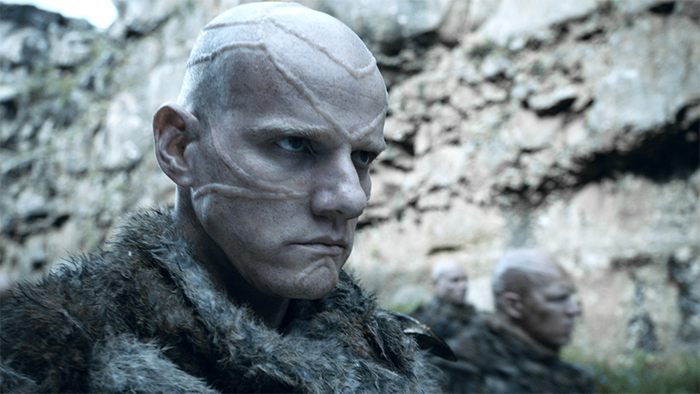
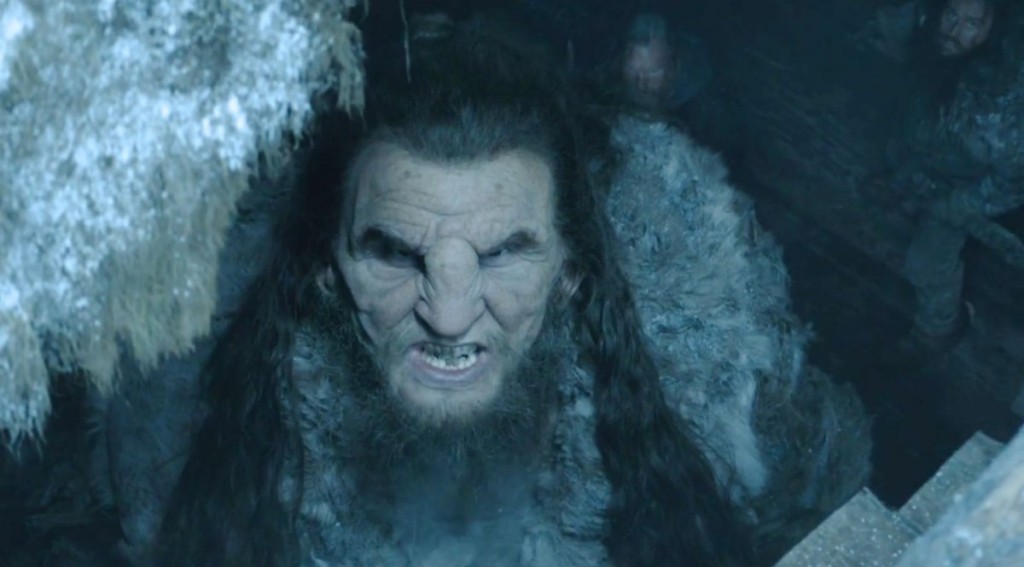
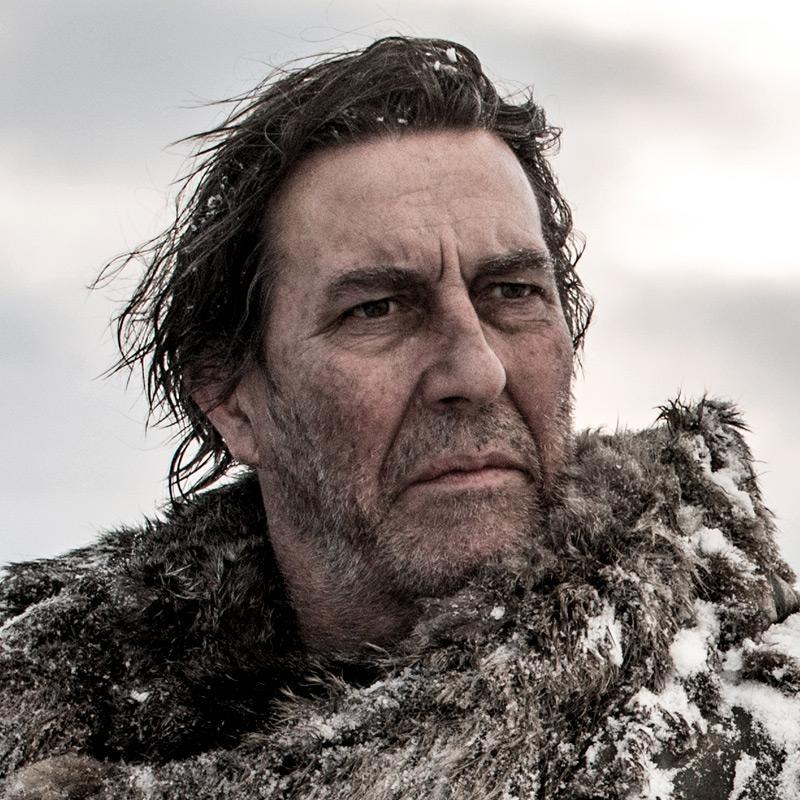
Hodor!
An interesting article Morgoth. At least in the TV show we got to see the Giants and the Thenns. I presume other wildlings like Tormund and Ygritte were members from one of the other tribes you mention.
“Mance has still a role to play in the novels, but in the show, he’s already dead.”
…………………………….
I’ve been operating on the assumption that characters killed off prematurely on the show who are still alive in the books really don’t have a significant role to play in the “endgame.”
It sucked that Barristan Selmy got killed off in a back alley on the show; as I understand it, the books left off with him mustering Dany’s forces to defend Mereen. I hated to see Stannis depart the show – mostly because I’ve been a huge Stephen Dillane fan ever since his amazing turn as Thomas Jefferson in HBO’s “John Adams.” [Great “parallel” scene in which he presents his draft of the Declaration of Independence to Ben Franklin and John Adams, and explains how he chose every word carefully. When Stannis was dictating his letter with precision in S2, and correcting grammar of Davos and then the Night’s Watch (“Fewer”🤓), I couldn’t help but recall that scene from “John Adams”.)
As for Mance… As I understand it, in the books
. I guess his early exit from the show may mean he won’t be around much longer in the books.
I guess the show used Mance’s abrupt exit at the beginning of S5(?) to set up the “how many people died for his pride” vs. “save your people and bend the knee” dilemma Jon faced in S7; and to remind us that being burned alive is “a bad way to go” – to make Shireen’s death all the more horrific. 😖
P.S. I never did understand show! Mance’s stubbornness.
I didn’t get it either but what I think he was trying to convey was that it took 20 years to unite all these different clans and if they saw him bend the knee, the clans would scatter and therefore, ultimately die. It would have all been for nothing, then.
I think he was genuinely concerned for the fates of the free folk.
Interestingly, when Tormund asks Jon the rhetorical question of how many died for Mance’s pride, it would seem that Tormund had a better sense of what the free folk would accept/tolerate than Mance did.
Then again, hindsight is always 20/20, isn’t it?
Thanks for this, Morgoth. I do think that the Thenns “got the short end of the stick”; I had been interested to see how the show would portray then, but then it really didn’t, only giving their name to a group of scarified cannibals (Ice River Clans or another, maybe merging with Scagosi) who can be found in the books but not as ‘Thenns’.
The Thenns in the books have a ‘bronze age’ culture, with key elements of militarism, bronze-smithing and bronze armour, and a hereditary chieftainship. Think Homer’s Iliad and all that, and also interpretations of bronze age archaeological findings in Britain. The Thenns seem boastful, prideful, but also open to alliances and respectful of the skills of others – hence in ‘Dance’ the (sorry, book spoiler here) –
Anyway, suffice it to say that I’d have liked to see the show portraying Thenns as they are in the books; and I hope for more book Thenn portrayals in the future, and some developments on parallels between their culture and those of the Northern chieftainships, of which two chiefs appear in Dance to in part check out Jon as Lord Commander.
But I’m getting much too much into ‘book spoiler’ territory here, so will leave off with just a wish for more detail and context on the diverse cultures of northern Westeros (in either medium).
And just as an afterthought – all these cultures or ‘tribes’ should have their music, in book or show.
Erica,
Yes! Interesting point about Tormund’s perspective.
Until Tormund said that line about how many of his people died for Mance’s pride, I hadn’t put two and two together and realized that all of the Free Folk who perished (or got wightened) at Hardhome would’ve been safely south of the wall already but for Mance’s “pride.”
It’s nice that all he ever wanted was the “freedom to make [his] own mistakes” and he didn’t like to kneel. However, sometimes it takes more courage to swallow your pride and consider the consequences your actions have on others. That is why, to me, Jon is a real “hero.”
In fact, I trace Jon’s evolution as leader to two early events: one was when he realized some of the other NW brothers like Grenn and Pyp (who he first claimed hated him “because I’m better than them”) didn’t have the same advantages he had growing up, and suffered real injustices .
The second, and most significant (in my view) was his early argument with Ygritte, when she presented the Free Folk’s version of history, i.e., whose “land” it was. (I’ll get the exact quote in a few minutes.) Jon got all bent out of shape and boasted about Ned Stark having the blood of the First Men, and “my ancestors lived here, same as yours.”
Ygritte replied simply: “Then why are you fightin’ us?” In that moment, I think Jon learned some real empathy.
(Of course, Ygritte’s subsequent flirting, teasing and seduction was beautifully written and acted. I just appreciated how Jon began to realize the Free Folk were not his enemy: something he explained in mid-season 5 in an underappreciated scene when he unchained Tormund…and a bromance was born. 👨❤️👨)
Erica,
(Continued from 4:46 pm)
Here’s the passage I was referring to…
From 2×7, Ygritte & Jon
Ygritte: …..You think you’re better than me, crow. I’m a free woman.
Jon: You’re a free woman?
Ygritte: I might be your prisoner, but I’m a free woman.
Jon: If you’re my prisoner, you’re not a free woman. That’s what what “prisoner” means.
Ygritte: And you think you’re free? You swore some stupid oath and now you can never touch a girl.
Jon: It was my choice to say the words.
Ygritte: So you don’t like girls?
Jon: Of course I like girls.
Ygritte: But you chose never to touch them.
Jon: That’s the price you pay if you want to be a man of the Night’s Watch.
Ygritte: So instead of getting naked with a girl, you’d prefer to invade our lands.
Jon: Invade your lands? Wildlings raid our lands all the time. Some of them tried to kill my little brother, a crippled boy!
Ygritte: They’re not your lands! We’ve been here the whole time! You lot came along and just put up a big wall and said it was yours.
Jon: My father was Ned Stark. I have the blood of the First Men. My ancestors lived here, same as yours.
Ygritte: So why are you fighting us?
I retrieved the S5e5 scene of Tormund and Jon…and the theme of selfish pride is in there too:
Jon unchains Tormund, S5e5
Jon: Where are the rest of the free folk now? Where have they gone? Who leads them?
Tormund: They followed Mance. They won’t follow anyone else.
Jon: What about you?
Tormund: Hard to lead when you’re in chains.
Jon: What if I unchained you?
Tormund: Why would you do that?
Jon: Because you are not my enemy. And I’m not yours.
Tormund: You sure seemed like my enemy when you were killing my friends.
Jon: For 8,000 years the Night’s Watch have sworn an oath to be the shield that guards the realms of men. And for 8,000 years we’ve fallen short of that oath. You belong to the realms of men. All of you.
Tormund: And now everything is going to change?
Jon: It is.
Tormund. Why now?
Jon: Because now I am Lord Commander of the Night’s Watch.
Tormund: What would you have me do, “Load Kommandahh”?
Jon: I’d have you go north of the Wall. Gather the remaining free folk wherever they are and bring them back here. I’ll open the gates for them and let them through. I’ll find them lands to settle south of the Wall.
Tormund. They won’t kneel for you and neither will I.
Jon: I don’t want them to kneel for me. I want them to fight with me when the time comes.
Tormund: The day I ask my people to fight with the crows is the day my people cut my guts from my belly and make me eat them.
Jon: And how many of your people can’t fight? The women, the children, the old, the sick…what happens to them? You’re condemning them to death. Worse than death because you’re too proud to make peace. …Or maybe you’re not proud. Maybe you’re just a coward.
Tormund: Easy thing to say to a man in chains.
(Jon unchains him; handcuffs fall to the floor.)
Jon: Your people need a leader. And they need to get south of the Wall before it’s too late. We don’t have much time and they have less. The Walkers are coming and they’ll hit your people first. I’m not asking you to make peace to save your skin. Make peace to save your people.
Tormund: Most of them are at Hardhome.
You know where that is? Up on Storrold’s Point.
Jon: I can give you 10 horses and nine other men. You can get there in a week.
Tormund: We’ll need ships.
Jon: I’ll talk to King Stannis about lending you his fleet.
Tormund: All right, then you’re coming with me. You’re the Lord Commander of the Night’s Watch. They need to hear it from you. They need to know the ships they are boarding won’t be torched in the middle of the sea. You come with me, or I don’t go.
—————-
(Next scene: With Stannis and Davos in attendance, Jon informs NW brothers of his plan.)
NW brother: …You’d bring wildlings here through our gates?
Jon: Men, women, and children will die by the thousands if we do nothing.
NW brother: Let them die. We got our own to worry about. Less enemies for us.
Stannis: Fewer.
Davos: What?
Stannis: Nothing.
Ten Bears,
Hahaha…yes, fewer.
Tormund saying that neither he, nor his fellow free folk would kneel in the scenes you illustrated is exactly why I said hindsight is 20/20. (He still hasn’t kneeled to Jon, btw. 🙂 and he is the de facto leader of the free folk, so maybe he shouldn’t be preaching about pride afterall.)
Have to add:
Jon: How many men do we have to fight in the North? Ten thousand? Less?
Davos: Fewer.
Jon: What?
Davos: Missandei of Naath!………
Erica,
• I still chuckle that with one word, Stannis won WoW funniest quote of S5 (and maybe funniest scene too?)
• It looks like Jon + Tormund have gone back and forth with the personal pride vs. survival of people quandary.
• In a sense, Randyll Tarly and especially Dickon Tarly came out on the wrong side of this dilemma. (Why not bend the knee and live to fight another day?)
• Question [for book readers?]: In Dany’s first scene with Jon, she vaguely alluded to an oath sworn to the Targaryens by Jon’s ancestors.
Wasn’t there a Stark king (“The King Who Knelt”?) who decided to swear fealty rather than let his armies get roasted by Targ dragons? I suppose he went down in history as faint-hearted, but his people lived.
Excellent article! I’ve always found the Free Folk an incredibly diverse and fascinating people. I think the show has done a reasonably good job of showing the differences and similarities between them.
I do agree that the Thenns maybe got a bit of the short straw, and would’ve loved to see Sigorn’s book plot in the show (along with Jon’s interest in the history and culture of the Free Folk we see develop in A Dance with Dragons).
It is, I think, only when we consider the differences between these clans and tribes that it becomes clear how much Mance achieved in uniting them.
Also, while the Free Folk are oft perceived as being wild and backward by those who live south of the Wall, the hereditary nature of the title Magnar of Thenn is not the only way in which they are progressive. While the Targaryens wed brothers and sisters, and there are examples of cousin and uncle/niece marriage in more than one noble family tree, Ygritte tells Jon that it is vile to wed kin as it weakens the tribe (isn’t the Targaryen madness an indication of this?). Craster is the exception not the rule.
From The World of Ice and Fire:
Torrhen’s scouts had seen the ruins of Harrenhal, where slow, red fires still burned beneath the rubble. The King in the North had heard many accounts of the Field of Fire as well. He knew that the same fate might await him if he tried to force a crossing of the river. Some of his lords bannermen urged him to attack all the same, insisting that Northern valor would carry the day. Others urged him to fall back to Moat Cailin and make his stand there on Northern soil. The king’s bastard brother Brandon Snow offered to cross the Trident alone under cover of darkness, to slay the dragons whilst they slept.
King Torrhen did send Brandon Snow across the Trident. But he crossed with three maesters by his side, not to kill but to treat. All through the night messages went back and forth. The next morning, Torrhen Stark himself crossed the Trident. There upon the south bank of the Trident, he knelt, laid the ancient crown of the Kings of Winter at Aegon’s feet, and swore to be his man. He rose as Lord of Winterfell and Warden of the North, a king no more. From that day to this day, Torrhen Stark is remembered as the King Who Knelt…but no Northman left his burned bones beside the Trident, and the swords Aegon collected from Lord Stark and his vassals were not twisted or melted or bent.
Torrhen ultimately bent the knee rather than fight, and in doing so he saved the lives of his people. He knew from the Targaryens use of it at Harrenhal and the Field of Fire the damage dragonfire could do.
While I don’t think we know enough about him to make a definitive assessment, I tend to think that Torrhen bent the knee for the same reason that Jon did in season seven – because the lives of his people meant more to him than the title of King. And that is what I think Tormund is getting at; refusing to bend the knee is all very well, but when an entire people face extinction is it not better to do whatever it takes to save them?
Thanks for the article, Morgoth. It’s my understanding that Ciaran Hinds can sing, the show runners just didn’t bring out Manse’s bardic side on the show. I’m probably the exception to the rule but I wasn’t that struck on the ADWD Winterfell plot and wasn’t sobbing my socks off because that part of the story was lost in adaptation (though I was sorry for JP in ADWD though she was cut from the show). I’ve said before (though it probably will never come to fruition) but I’d like somebody like Big Finish Productions or even the Beeb radio (or any reputable radio company) to do a radio adaptation of ASOIAF because like when reading the books, a listener could imagine GRRM’s world in his/her mind and it would be less costly to do battle episodes – well really any grand event from the story. I think such an adaptation would still have to be shortened though. Perhaps in a radio adaptation the different Wilding clans could be referenced more deeply.
Alba Stark,
Thanks for that explanation! Generally, I tend to avoid books! canon — so I don’t get confused. [For example, variations in book! prophecies vs. the version in the show make it impossible to reconcile them without my head exploding.]
Anyway, I found it interesting that King Torrhen apparently confronted the same choice that Jon did, and will likely encounter “blowback” from disgruntled Northern lords when he gets back to Winterfell. From the excerpt you provided, some of King Torrhen’s short-sighted contemporaries
were guided by pride and Northern exceptionalism:
“Some of his lords bannermen urged him to attack all the same, insisting that Northern valor would carry the day.”
They were blinded to the practical realities, and fell back on old biases.
The flip side of this myopia was the prejudice Lord Commander Jon faced when trying to explain to his NW brethren why he was determined to let the Free Folk through the Wall. Objectively speaking, it made perfect sense to recruit them as allies, rather than have them added to the Undead Army. And as Jon explained to Tormund in S5e5, for 8,000 years the NW had fallen short of its original mission to “protect the realms of men” by treating the Wildlings as “the enemy.” (I think Davos also observed that the only difference between the NW and Wildlings is that the Wildlings were born on the other side of the Wall.)
Sorry for rambling….
Alba Stark,
I’m sure you’re right:
“While I don’t think we know enough about him to make a definitive assessment, I tend to think that Torrhen bent the knee for the same reason that Jon did in season seven – because the lives of his people meant more to him than the title of King. And that is what I think Tormund is getting at; refusing to bend the knee is all very well, but when an entire people face extinction is it not better to do whatever it takes to save them?”
Dame of Mercia,
Obviously I don’t know how detailed Wildling history was presented in the books. Although the show didn’t get into the quirks of the various clans (tribes?), I thought it did a pretty good job of illustrating Wildling culture via Ygritte’s conversations (well, teasing, insulting and flirting) with Jon.
With a nod to Thronetender, these were “high thread-count” scenes that gave us lots of backstory during dramatic – and sometimes comical – exchanges. The summit with the Wildling chieftans at the beginning of “Hardhome” was another example. (And also touched on the “courage to make peace with your enemies” recurring theme.)
I miss Ygritte. I miss Karsi too. 😟
This is one major problem I had with Season 7. Their decision to retcon things like this.
Mance clearly said that his decision not to bend the knee had nothing to do with pride and everything to do with refusing to enlist his people in someone else’s war.
The assumption that the Wildlings would have been safe and alive south of The Wall if Mance had bent the knee is not entirely certain.
Had Mance bent the knee and the Wildlings crossed The Wall then they immediately would have been thrown into battle against The North. Most likely a united North. How many tens of thousands of them would’ve been sent to their slaughter trying to claim The North and the rest of the Seven Kingdoms for Stannis?
Baratheon soldier: “We’re too far from the gate. The fire. Their archers. Hundreds will die”
Stannis: “Thousands”
And if Stannis failed. The Wildlings would be slaughtered anyway.
Of course, it could be argued that getting his people south of The Wall by any means necessary should’ve been Mance’s first priority and then they could go about avoiding being used as cannon fodder in Stannis’s army.
But regardless of the logic behind Mance’s decision, the one thing he specifically stated did not come into the equation was his pride. But for some reason the producers appeared to rewrite history for plot convenience.
Also, it’s worth bearing in mind that the Night’s Watch mutineers murdered Jon for letting the Wildlings through The Wall. If Mance had bent the knee and Stannis began letting the Wildlings through The Wall, might the Night’s Watch mutineers have attempted to murdered Stannis, and probably Mance, instead?
If they consider it their duty to defend the Seven Kingdoms from the Wildlings, then allowing Stannis to march on the Seven Kingdoms with an army of Wildlings, bringing war and chaos, would be a pretty major dereliction of their duty.
Therefore it’s possible the Wildlings would never have made it past The Wall even if Mance did bend the knee to Stannis.
I absolutely loved this article! I really enjoy the different wildlings. I find them fascinating. Just as every house as their own Sigil, which is an important detail, the wildlings differences are important as well. It is a shame this couldn’t have been explored more in the TV series. I think it would make an excellent spin off. I do believe that race for a spin off will be a very tight one though. The imaginary world of GRRM is do detailed the possibilities are endless.
Ramsay’s 20th Good Man,
I really loved season 7 but one complaint I had was with my favorite character (besides Jon &Dany), Tormond. Tormond saying to Jon about how many people died because Mance Rader wouldn’t bend the knee was unlike his character and just plain wrong. I absolutely see why they added the comment, to make bending the knee to Dany easier in the TV series. I actually don’t even like how the wildlings are used as the front line defence in the Great War. It is like they are used to be slaughtered first. To me this mirrors real life perfectly in reference to how alot of our military come from lower middle class and poor families. Obviously that is just my opinion and I don’t mean to offend anyone.
Ramsay’s 20th Good Man,
I concur. Mance’s decision not to bend the knee had nothing to do with pride and neiter did Jon’s. Both faced the same problem: had they accepted the terms of surrender, the interests of their people would have never been taken into considerattion. Stannis would have thrown the wildlings into his personal war and Dany would have done the same with the Northern forces. Remember what Tyrion said: “The war against my sister has already begun etc.” So, had Jon bended the knee in 703, Dany would have ordered him to lay a siege on KL and the North would have been left open to the WW attack.
So, Mance’s “pride” – or I would rather say dignity – and his death wasn’t pointless. He taught Jon that he had to offer the wildlings a semi-equal alliance and respect, if he wanted them on his side. Jon learned that lesson; he forgen an alliance based on the common interest, he treated the wildlings fairly, and IMO that was the reason why Tormund came to the conclusion that knee-bending was not that bad after all.
Eventually, Jon taught Dany the same lesson, and that was absolutely necessary for Dany’s character development. Sure, she wasn’t Stannis. In fact, Stannis was even more concerned about the good of the realm than Dany but in general both of them were too concentrated on fulfilling their alleged destiny to realise what this destiny was all about: they were blid to the real threat. Figuratively speaking, Jon dragged Dany under a cold shower and made her open her eyes. Had he been more submissive, Dany would have used him and then kicked him out like she did with Daario.
And in general, I don’t think that knee-bending in exchange for survival is such a good idea. Basically, it’s just slavery. By extension, we could say that everyone shoud bow to the Night King – he is the strongest after all. But we roote for those who fight against him and in general we always root for those who fight against opression. Knee-bending survivalists are called collaborationists and I can’t recall many cases in human history when the collaborationists would have been given much credit.
Ramsay’s 20th Good Man,
“Mance clearly said that his decision not to bend the knee had nothing to do with pride and everything to do with refusing to enlist his people in someone else’s war.”
…………………
Right! That’s what I thought I remembered his rationale was. I recall Jon telling Mance he was making a mistake – and that Mance was adamant that he wouldn’t enlist his people in someone else’s army.
Mance’s lute actually does qppear as a pro in his first scene – I just noticed it on my last viewing.
Annoyingly though (for me, I play the lute) there’s no way am actual lute could survive the climate north of the Wall.
Nor would a solid gold lute, as offered as a prize in the books to the best musician at Joffrey’s wedding, work in real life.
It’s so sad – I can look past the dragons, faceless assassins and so on, but the unrealistic lutes take me right out of the illusion. 😉
Rob,
Looks like I failed at the spoiler tags too…sorry everyone.
Wun Wun (whose name is a reference to former Giants quarterback Phil Simms, whose jersey number was 11)
That’s remarkable! And so George RR … I had no idea; thanks!
Thanks everyone, for the kind comments. 🙂 Really glad to see you enjoyed this new article!